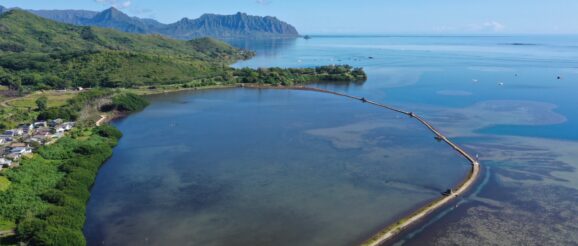UH to develop Pacific Islands climate-resilient, food innovation network

The University of Hawaiʻi plans to establish a first-of-its-kind Climate-Resilient Food Innovation Network (CliRFIN) that will serve as a hub for Hawaiʻi and U.S-affiliated Pacific Islands (USAPI) to develop collaborative, food innovation solutions driven by Indigenous knowledge systems and modern technology that address climate change impacts.
The $1 million, 24-month award is part of the first-ever U.S. National Science Foundation Regional Innovation Engines (NSF Engines) Development Awards, which aim to help partners collaborate to create economic, societal and technological opportunities for their regions. The NSF Engines Development Award 2305455: Advancing climate resilient food innovations (HI, USAPI), one of 44 awards granted nationwide this year, provides support for the development of an organizational structure and strategy, including identifying partnerships, resources and initiatives to expand workforce development and commercialization opportunities around innovative, climate-resilient food systems. The initiative could eventually be eligible for another NSF award of up to $160 million.
“This is an exciting and unique opportunity for UH, the State of Hawaiʻi and USAPI to be able to build a collaborative, tech-driven, regional network to support sustainable, long-term-growth solutions to universal issues like climate change and food insecurity,” said Vassilis L. Syrmos, UH vice president for research and innovation. “This initiative has the potential to position our state as a global leader and serves as an example for other regions to identify with and develop scalable, climate-resilient food systems reflective of their people, place and Indigenous practices.”
There are four phases for CliRFIN:
- Assessment: Conduct in-person meetings with current and potential partners to share information, evaluate resources, opportunities and challenges of expanding food production systems and workforce development in the region.
- Planning: Combine the information from the assessment phase to generate plans to identify and prioritize goals and objectives and the steps to achieve them.
- Coordination: Establish a framework of the organization, communication and knowledge sharing among the network, including governance activities, formal and informal meetings, and social events to facilitate the sustainable growth of CliRFIN.
- Application: Apply for an NSF Engines Type-2 award, worth up to $160 million over a 10-year period, upon solidifying organization and partnerships in order to initiate and ramp up activities over an extended period.
Integrating Indigenous knowledge
“Fundamental to our efforts will be the deep integration of Indigenous knowledge systems and western methodologies to develop a transformative and holistic approach necessary to thrive and sustain these innovative food systems,” said Erik Franklin, CliRFIN’s director and fisheries team leader and associate research professor at the Hawai’i Institute of Marine Biology. “By underpinning inclusive principles and equitable practices, and broadening our participation of historically underserved and underrepresented populations, we can create more diverse and effective opportunities for identifying problems and solutions.”
The network brings together the skills and expertise of a diverse group of innovators and entrepreneurs from different industries, governments, small businesses and venture capitalists including: East-West Center; Elemental Excelerator; HATCH; Hawaiʻi Good Food Alliance; Hawaii Technology Development Corporation; Natural Energy Lab of Hawaiʻi Authority; Office of the Governor, State of Hawaiʻi; Pacific Disaster Center Global; Hawaiʻi ʻUlu Cooperative; and the University of Guam.
The UH Office of the Vice President for Research and Innovation will provide leadership support for the efforts of CliRFIN with multidisciplinary support provided from UH Mānoa’s leadership teams from: School of Ocean and Earth Science and Technology, College of Tropical Agriculture and Human Resources Department of Tropical Plant and Soil Sciences, UH Sea Grant College Program and College of Engineering.
Growing regional economies
“Solutions to some of our biggest challenges can be found when we incorporate Indigenous knowledge into modern technology,” said U.S. Sen. Brian Schatz. “This new program will do just that, and help us develop better, more resilient ways to continue providing local people with fresh food, even as climate change threatens how we produce and distribute food.”
CliRFIN will engage a collective of 18 Minority Serving Institutions for Native Hawaiians, Asian Americans and Pacific Islanders from: the U.S. Territories of Guam and American Samoa; the Commonwealth of the Northern Mariana Islands; Republic of Palau; the Marshall Islands; and the Federated States of Micronesia.
“These NSF Engines Development Awards lay the foundation for emerging hubs of innovation and potential future NSF Engines,” said NSF Director Sethuraman Panchanathan. “These awardees are part of the fabric of NSF’s vision to create opportunities everywhere and enable innovation anywhere. They will build robust regional partnerships rooted in scientific and technological innovation in every part of our nation. Through these planning awards, NSF is seeding the future for in-place innovation in communities and to grow their regional economies through research and partnerships. This will unleash ideas, talent, pathways and resources to create vibrant innovation ecosystems all across our nation.”
For more information about the NSF Engines Development Award 2305455: Advancing climate resilient food innovations (HI, USAPI), visit .
Read also on UH News and Honolulu Star-Advertiser.
